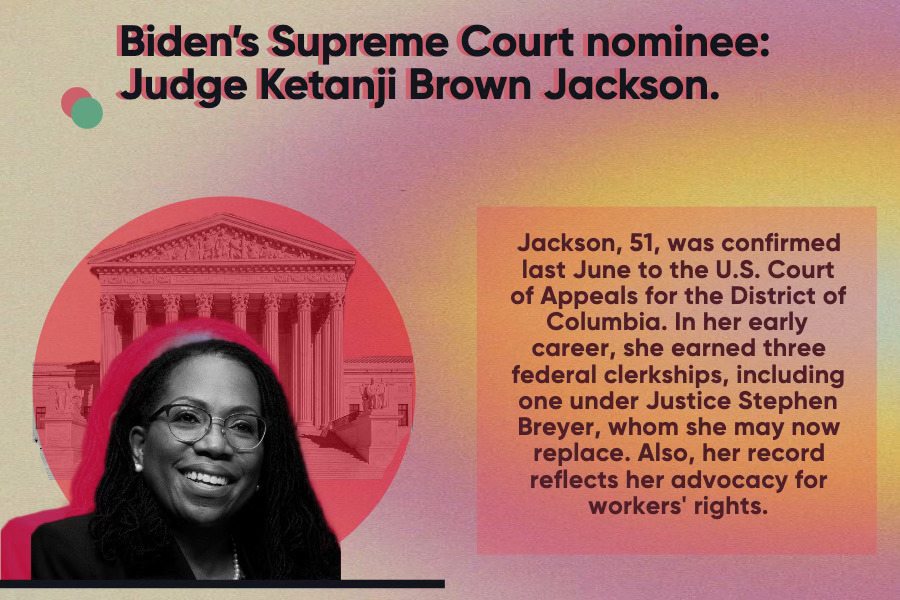SCCC Community Reacts to Kentanji Brown Jackson’s Supreme Court Nomination
While symbolic for the Black community, some are skeptical that this will change the ideological scale of the court.
President Biden selected Kentanji Brown Jackson on Friday, Feb. 25, 2022, to be the next Supreme Court justice. If confirmed by the Senate, Jackson would become the first Black woman and the third African American to serve on the court.
February 27, 2022
President Joe Biden has had a rough beginning to his presidency. From the disaster in Afghanistan to the collapse of the Build Back Better plan, Biden’s approval rating has been significantly low. However, with the midterms approaching and with Justice Stephen Breyer announcing his retirement, Biden’s campaign promise of electing a Black woman to the Supreme Court has been fulfilled.
On Feb. 25, White House sources disclosed that Biden’s pick is none other than federal Appeals Court Judge Kentanji Brown Jackson. His nominee has yet to be confirmed by the Senate but the selection has a real chance of reinvigorating the Democratic base.
A big contributing factor to Biden’s success, in the 2020 elections, was the large turnout of Black voters. Out of the 8% of Black women voters, 90% of those Black women voted for President Biden. Biden’s commitment to his promise would satisfy this demographic by giving them representation at the highest judicial level.
“The majority of the Democratic party is not just any women of color, it’s specifically women who are African American. In large part, I definitely think he is relying on that support going forward with the midterm election and whoever is going to be the nominee in 2024,” said SCCC political science professor Aneu Crossen. “Since you know your turnout is largely motivated by this demographic then it would probably be smart to satisfy that demographic.”
Biden selected Jackson over two other serious contenders: Federal District Judge J. Michelle Childs and California Supreme Court Justice Leondra Kruger.
Childs was a serious contender because she had the backing of House Majority Whip Jim Clyburn (D-SC 6th District) and Republican Sen. Lindsey Graham (R-SC). However, Jackson was the perceived shoo-in for the nomination because of her bipartisan support in her Senate confirmation for the federal Appeals Court, which is one of the last stepping stones to becoming a U.S Supreme Court Justice.
“It was a smart pick. She was already confirmed to sit on one of the most important federal courts with support from both Democrats and some Republicans,” said Nicholas Giordano, another SCCC political science professor. “It should make the process a little smoother, and I anticipate the Senate will confirm her.”
Although this nomination would not change the ideological scale of the Supreme Court, with representation being a 6-3 conservative majority, it will provide a new perspective–whether it’s moderate or progressive. Especially with cases being brought to the Supreme court regarding topics such as abortion laws, police reform, and gun legislation. However, it’s hard to say whether the new Supreme Court nominee would be able to make substantial change.
“It doesn’t really change the dynamic,” said Giordano. “When it comes to the abortion issue, President Biden will be replacing Justice Breyer with someone who holds similar beliefs. It would be much more consequential had someone like Justice Clarence Thomas retired because then you’d be replacing a conservative Justice with a progressive Justice.”
Regardless, this eventual announcement will be historic for the Black community, especially with February being Black History Month. For young Democrats, particularly those of color, it will give a voice to those who are marginalized in our country.
“The court should look like our country, it shouldn’t be all men or all women. Someone’s race, sexual identity, and where they come from geographically all matter because the court is not making decisions for one part of the country, it’s making a decision for the entire country,” said SCCC political science major Robert Pszybylski. “So having a diverse makeup is important.”
For Black women and girls, Jackson’s nomination is another testament to how far American society has evolved.
“Specifically, for myself, it would mean having representation. I can’t wait for the day, even if it’s 50 years from now when these things won’t matter,” Crossen said. “When the first won’t matter because people will be recognized for just how they are personally.”


















































